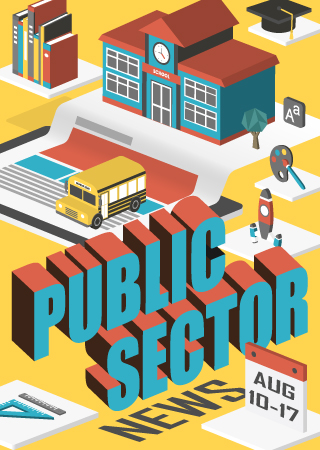Public Sector News: Utilizing data and social media for public benefits

 The week of August 10, 2015 was quite an interesting week in public sector news, especially in regard to education. A story about child geniuses destined for careers in cybersecurity is particularly noteworthy. And a passionate argument about data in context for educators by a superintendent of schools in Connecticut is a real attention grabber. Take a more in-depth look at some of the week’s highlights.
The week of August 10, 2015 was quite an interesting week in public sector news, especially in regard to education. A story about child geniuses destined for careers in cybersecurity is particularly noteworthy. And a passionate argument about data in context for educators by a superintendent of schools in Connecticut is a real attention grabber. Take a more in-depth look at some of the week’s highlights.
Data is meaningless without context
Writing in a Madison Patch article, Thomas Scarice, superintendent of schools in Madison, CT, insists that without context data is meaningless, and he urges educators to look at data differently. “The educational community, the very field that finds its existence in the care and welfare of children, particularly where ‘the story’ matters most, continues to kneel and bow at the altar of big data, any data that can be captured, with flagrant disregard for its importance or meaning.” Scarice goes on to say that those responsible for looking at data need to understand the system and the context or story behind the data. —Thomas Scarice for Madison Patch
How big data is shaping the digital classroom
We have all read, seen and even experienced big data at work in businesses. Educational institutions, however, are utilizing analytics to change how students engage and learn. According to Maria Fonseca and Paula Newton, “examples range from a privately held chain of elementary schools in Africa to a group of San Francisco schools.” Massive open online courses (MOOCs) offered by universities worldwide offer another example from institutions of higher learning. Fonseca and Newton report that capturing and utilizing data to enhance education “seems to be a novel trend in education that is catching up.” —Maria Fonseca for IntelligentHQ
Virginia Beach launches an app to aid evacuation planning
In a StateScoop article by Jake Williams, he quotes Matt Arvay, chief information officer (CIO) of Virginia Beach, Virginia, who said, “During emergencies, real-time data is not only necessary, it’s absolutely critical.” This statement points out how many cities are realizing that they need to use data and analytics to support their emergency management plans, and now Virginia Beach has an app to aid its evacuation plans. The article also quotes Erin Sutton, deputy emergency management coordinator of Virginia Beach, who said that having tools well suited for displaying and understanding evacuation data enables emergency operations teams to operate with high efficiency and effectively develop and maintain evacuation plans. —Jake Williams for StateScoop
Tracking foodborne illness and improving disaster response with social media
Increasingly, organizations employ data to help reduce the risk and impact of natural disasters and emergencies worldwide. Elaine Nsoesie, a biostatistician and research fellow in pediatrics at Boston Children’s Hospital, conducted research to determine if data from social sites can offer early indicators of foodborne disease outbreaks and be a catalyst that prompts local health authorities to begin investigations. Statistics Without Borders also evaluated social media traffic during the aftermath of Typhoon Haiyan that struck the Philippines in November 2013. The goal was to develop a set of best practices for social media analytics that emergency response managers could implement. According to statistician Michiko Wolcott of the American Statistical Association, social media can play a key role in disseminating information and in the collection of relevant data during a natural disaster. —American Statistical Association for Phys Org
Big data is watching: A new power is not without its dangers
Governments worldwide are investing in data to help improve operations and decision making, but many are still trying to balance the need for data with protecting the privacy of citizens. Brenda Aynsley, reporting for The Australian Business Review, writes that the government of New South Wales is planning a “whole-of-government data analytics center” that highlights big data’s potential for influencing and informing government policy decisions. Aynsley goes on to report that involvement by privacy and customer service advocates is vital because harnessing big data carries complications, particularly with regard to the rights and best interests of consumers, even as data analytics helps improve services. —Brenda Aynsley for The Australian Business Review
What public sector news stories caught your attention the week of August 10, 2015? Weigh in with your opinion on improving education with analytics.
Follow @IBMAnalytics
Source: IBM Feed